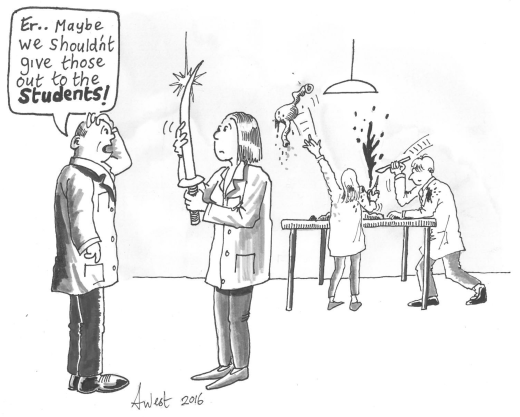Cutting down on injuries in the lab
Passing on our skills and knowledge to ensure that our students will go on to introduce good and safe practices into their own future working environments.

In my role as Biology Teaching Specialist, I work with a small technical team to support the academic staff in the School of Biology within the Faculty of Biological Sciences. We deliver undergraduate practical classes across all biology programme areas and by developing procedures, help to enhance the student experience and improve health and safety in the laboratory. We hope that by passing on our skills and knowledge, we can ensure that many of our students will go on to introduce good and safe practices into their own future working environments.
As part of the module on animal physiology, all students have the opportunity to dissect a chicken, in order to get experience at dissection and to gain knowledge of the anatomy of a bird. Currently, the students watch a video of a dissection, which they then follow in short sections. Initially, we found that despite giving instructions on the safest way to use dissecting instruments, there were a number of scalpel cuts to fingers. In one year alone, across two sessions totalling 170 students we attended to 16 incidents. Apart from the health and safety issues, this was disruptive to the practical as staff were taken out to deal with injuries.

Weapon of mass evisceration! by Andrew West
In 2015, together with Amy Taylor, the academic running these practical classes, the technical team determined to review the procedures to reduce scalpel cuts. There are parts of the dissection which do not require use of a scalpel and students were shown alternative ways to access the organs of the chicken without the need for sharp instruments. Where this could not be avoided, techniques were demonstrated and we emphasised the need for extra care. By a combination of continuous engagement and demonstration of safe practices from staff and demonstrators, we reduced the number of cuts from 16 to two.
Paul Beal, our Faculty Safety Manager, nominated our team for the annual Vice-Chancellor’s Awards for Health and Safety and we were delighted that Sir Alan chose to identify our achievement with his own special award.
I am personally particularly pleased that a team of technicians in the Teaching Labs had been recognised for our contribution to the well-being of our undergraduate students. I'm also happy to announce that in February 2016, we again ran this dissection practical and were able to report that there were no injuries at all over two sessions.
By Valerie Sergeant
Posted in: Technicians' network